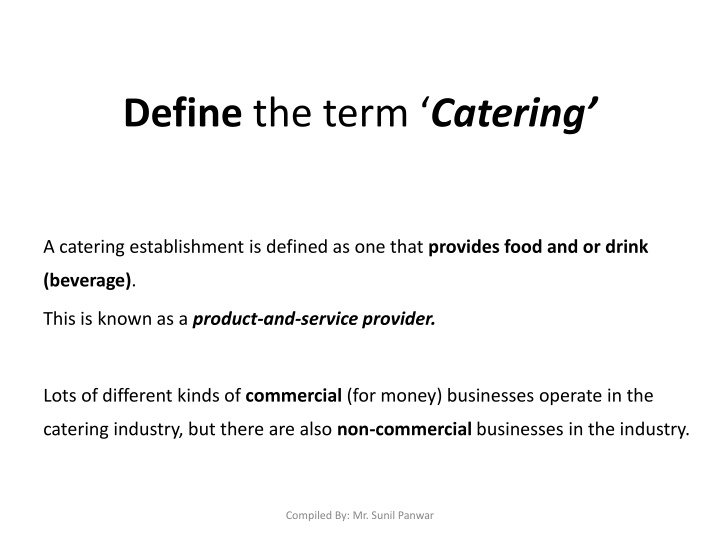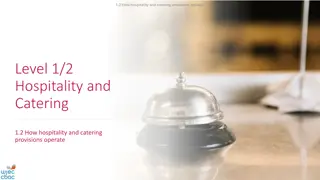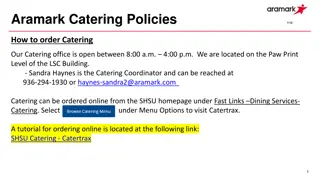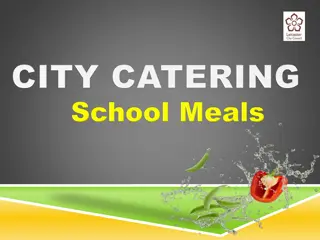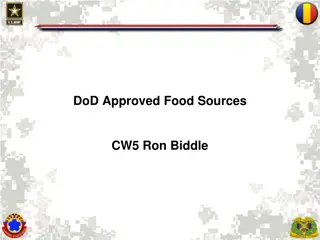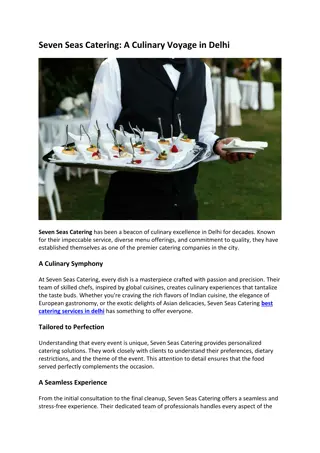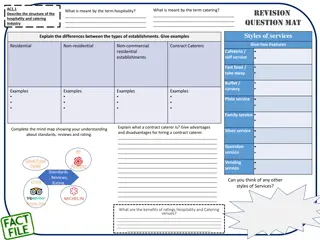Types of Catering Establishments and Their Functions
A catering establishment provides food and drink services, categorized into residential, non-residential, and non-commercial residential types. Contract caterers are crucial in providing catering services for various events. The catering industry includes restaurants, cafes, fast-food outlets, and more, serving diverse customer needs. Explore the functions and characteristics of different catering establishments.
Download Presentation

Please find below an Image/Link to download the presentation.
The content on the website is provided AS IS for your information and personal use only. It may not be sold, licensed, or shared on other websites without obtaining consent from the author.If you encounter any issues during the download, it is possible that the publisher has removed the file from their server.
You are allowed to download the files provided on this website for personal or commercial use, subject to the condition that they are used lawfully. All files are the property of their respective owners.
The content on the website is provided AS IS for your information and personal use only. It may not be sold, licensed, or shared on other websites without obtaining consent from the author.
E N D
Presentation Transcript
Define the term Catering A catering establishment is defined as one that provides food and or drink (beverage). This is known as a product-and-service provider. Lots of different kinds of commercial (for money) businesses operate in the catering industry, but there are also non-commercial businesses in the industry. Compiled By: Mr. Sunil Panwar
Types of Establishments - Catering (Hospitality will be looked at in more detail later in the course) There are 3 main categories into which a type of establishment can fall. 1. Residential establishments 2. Non-residential establishments 3. Non-commercial residential establishments How many can you think of? - Complete your brainstorm Compiled By: Mr. Sunil Panwar
Non- Residential Residential Types of Catering Establishments Non-Commercial Residential Contract Caterers - Caterers who provide food & drink for a function where catering facilites are not already provided. They prepare the food for functions such as weddings, banquets, garden parties & parties in private houses. They may prepare & cook the food in advance & deliver it to the venue, or they may cook it on site. They may also provide staff to serve the food if required. Contract caterers are used by a wide range of organisations as it relieves them of the pressures involved in catering for such events. Compiled By: Mr. Sunil Panwar
Lists of types of Catering Establishments Non -Residential Residential Non-Commercial residential Establishments Restaurants Cafes Fast-food outlets Public houses Wine bars Delicatessen & Salad Bars Take-away outlets School meals & transport catering Burger vans Hotels Guest Houses Holiday Parks Farmhouses Public Houses Bed and Breakfasts Hospitals Residential homes Prisons Armed Services Task - Make sure you have included all of these in your brainstorm. Now add some names of businesses that you know of next to each type of establishment. E.g Fast-food outlets Mc Donalds. Compiled By: Mr. Sunil Panwar
Public House & Wine Bar A pub, formally public house, is a drinking establishment fundamental to the culture of Britain. In many places, especially in villages, a pub can be the focal point of the community. The writings of Samuel Peppys describe the pub as the heart of England. Pubs would sell a range of beers, wines, spirits, and soft drinks. Recently there has been a growth in pubs selling meals and some now call themselves Gastro Pubs . Many pubs are controlled by breweries (companies who make alcoholic drinks). The owner, tenant or manager (licensee) of a pub is properly known as the "pub landlord". The term has come into use since Victorian times to designate the pub landlord. Known as "locals" to regulars, pubs are typically chosen for their proximity to work, the availability of a particular beer, hosting a darts team, having a pool table, or appealing to friends. Wine bar (also known as a bodega) is similar to a pub but has more of a focus on selling wine, than liquor or beer. A typical feature of many wine bars is a wide selection of wines available by the glass. Wine bars also tend to have a more up-market /m modern interior than a pub. Compiled By: Mr. Sunil Panwar
Bed & Breakfast A bed and breakfast (or B&B) is a small lodging establishment that offers overnight accommodation and breakfast, but usually does not offer other meals. Typically, bed and breakfasts are private homes with fewer than 10 bedrooms available for commercial use. The owners will live at the B&B and generally run it themselves, sometimes employing a cook and a cleaner. Compiled By: Mr. Sunil Panwar
Farmhouse Farmhouse is a general term for the main house of a farm. It is a type of building or house which serves a residential purpose in a rural or agricultural setting. Most often, the surrounding environment will be a farm. Farmhouses may provide similar accommodations to a B&B and a Guesthouse Compiled By: Mr. Sunil Panwar
Holiday Park A Holiday Park / camp , is a type of holiday accommodation that encourages holiday-makers to stay within the site boundary and provides entertainment for them between meals. They are sometimes known as Resort or Holiday village. Compiled By: Mr. Sunil Panwar
Guest House A guest house is a kind of lodging. In some parts of the world a guest house is similar to a hostel, bed and breakfast or whereas in other parts of the world, guest houses are a type of inexpensive hotel-like lodging. In still others, it is a private home which has been converted for the exclusive use of guest accommodation. The owner usually lives in an entirely separate area within the property and the guest house may serve as a form of lodging business. . Among the features which distinguish a guest house from a hotel, bed and breakfast, or inn is the lack of a full-time staff. Bed and breakfasts are usually family-owned, with the family living on the premises. Hotels maintain a staff presence 24 hours a day and 7 days a week, whereas a guest house has a more limited staff presence. Because of limited staff presence, check in at a guest house is often by appointment. An Inn also usually has a restaurant attached. Compiled By: Mr. Sunil Panwar
Hotels A hotel is an establishment that provides lodging paid on a short-term basis. The facilities provided depend on the quality of the hotel. Common things found in a hotel bedrooms could include en-suite bathrooms and air conditioning., a telephone, an alarm clock, a television, a safe, a mini-bar with snack foods and drinks, and facilities for making tea and coffee, bathrobes and slippers. Hotel rooms are usually numbered to allow guests to identify their room. Larger hotels may provide additional guest facilities such as a swimming pool, fitness center, business center, childcare, conference facilities and social function services Some hotels offer meals as part of a room and board arrangement. In the United Kingdom, a hotel is required by law to serve food and drinks to all guests within certain stated hours. Compiled By: Mr. Sunil Panwar
